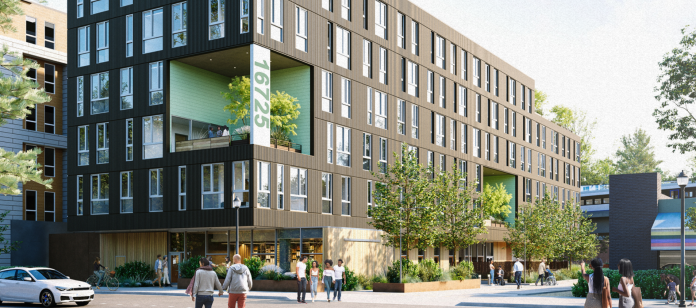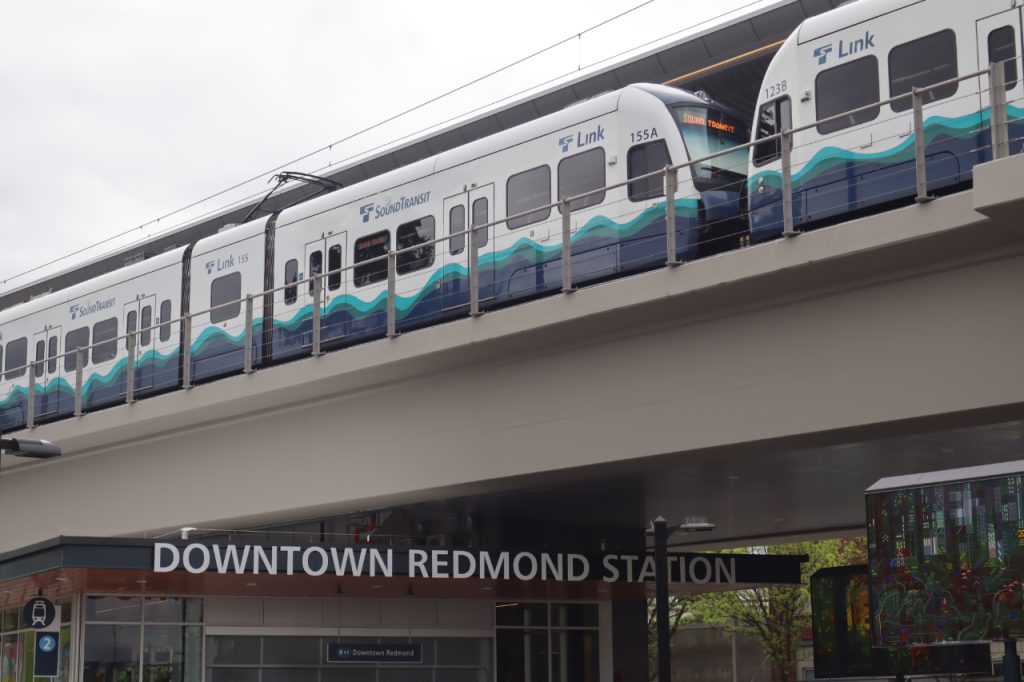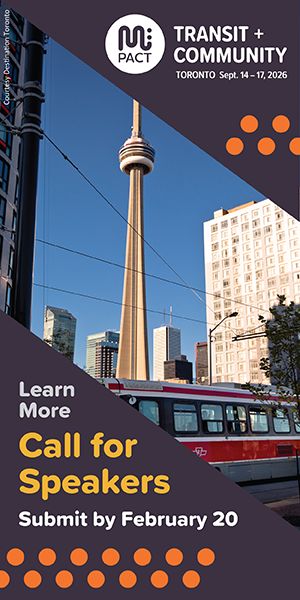
Redmond’s Hearing Examiner has dismissed a pair of appeals intended to force affordable housing provider Plymouth Housing to redesign a planned 100-unit building designed for people exiting homelessness in downtown Redmond. The appeals, which were focused on the amount of off-street parking included with the project, represented a final hurdle that Plymouth had to clear before it can move forward toward groundbreaking.
In making a final decision, Redmond Hearing Examiner Sharon Rice ruled that the City didn’t err in giving the green light to a reduction in the amount of required parking.
It’s been a long road for this specific project, which was originally planned by the City of Kenmore. But after significant community opposition, the Kenmore Council voted in late 2023 to reject a proposed development agreement that would have allowed the 100 homes to move forward in their city. Instead, the City of Redmond swooped in to rescue the project, offering a city-owned parcel that had specifically been purchased with the goal of creating affordable housing.
The facility at 16725 Cleveland Street will pair wraparound services with housing, which is located less than a five-minute walk from the newly opened Downtown Redmond light rail station. It’s also incredibly close to a myriad of other amenities located throughout the growing neighborhood. Few location offer better trail access, with the Redmond Central Connector trail steps away.
Nonetheless, the two appellants, both business owners in downtown, argued that the project should have been required to include more than the four off-street parking spaces planned. Furthermore, they argued that Plymouth should have accounted for the parking issues that they say Redmond’s downtown is experiencing — despite the fact that added parking would likely mean fewer affordable units could be built on the site.
Both appellants requested the exact same outcome from the Hearing Examiner: that the site plan entitlement approval be revoked, and a full environmental impact statement (EIS) be completed, which could add years to the building’s timeline.

“The proposed new building, which includes no designated parking for residents, visitors, or employees, will create an even more severe parking burden on surrounding buildings with unsecured lots,” read the appeal filed by Anu Tewari, a nearby grocery store owner. “The increase in vehicles on the streets will further present a challenge for businesses to provide parking for patrons, which will adversely impact their business. It will increase traffic congestion, affecting pedestrian safety and the ease of living, working, and visiting the neighborhood.”
Albert Rosenthal, who owns a dental services complex near the Redmond Library, raised similar issues in submitting his appeal.
A third appeal, filed by Nicholas Strathy, was dismissed before it could reach the point of a final ruling. Strathy is a member of the group Safe Eastside, which opposes permanent supportive housing and backs getting tough on homeless people rather than ramping up services. Strathy filed two referendum campaigns earlier this summer to repeal two major pieces of statewide housing legislation — dealing with transit-oriented development and parking requirements — in part due to issues raised throughout the Plymouth project’s appeal.
If Plymouth submitted a permit for the project today, no off-street parking would be required due to the site’s proximity to transit, which make it subject to land use reforms adopted as part of Redmond’s Comprehensive Plan update late last year. Since the project vested before the reform, the project lost several months to these appeals.
At a July 2 hearing, both Tewari and Rosenthal called witnesses intended to show that the city erred in allowing the project to move forward with a reduction in the amount of required parking. Among those called were Strathy, “We Heart Seattle” founder Andrea Suarez, and nearby business and property owners. Both called Vic Bishop, a Bellevue transportation engineer and failed state legislative candidate, as an expert witness. Bishop has been an outspoken advocate against multimodal upgrades like Bike Bellevue that might make it easier for people to get around the Eastside without a car.

In defending itself, Plymouth provided testimony from its own transportation engineer, William Popp. Along with other witnesses called by Plymouth, Popp debunked assumptions made by the appellants that assumed higher rates of car ownership of future tenants than Plymouth’s estimates.
“Mr. Popp testified that none of the Appellant testimony or documentary evidence caused him to feel his parking study required revision, largely because Appellants misunderstood the purpose of the provided permanent supportive housing, which is not intended as transitional housing to independent living, and because the light rail station is literally 200 feet from the subject site,” the final ruling noted.
In the end, the Hearing Examiner was required to give “substantial weight” to decisions made by the city’s technical committee, and nothing laid out by the two appellants proved to be enough to overturn that.
“None of the Appellant lay witnesses demonstrated educational or professional backgrounds that would make them capable of successfully refuting the evidence submitted by the Applicant’s qualified expert,” the ruling noted. “Applicant witnesses persuasively testified that both the variables in the project’s parking study and the recommended transportation management plan measures were thoughtfully selected in light of the project’s actual goals and target residential population.”
Notwithstanding an appeal to King County Superior Court, the Plymouth project can now move forward toward construction. When complete, the building will join a growing number of facilities on the Eastside for people exiting homelessness, a sea change compared to just a few years ago. Last year, King County celebrated the opening of Health Through Housing Redmond, which converted the former Silver Cloud Inn into 100 units of permanent supportive housing, part of a countywide effort to create 1,600 such units across the entire county.
The investments are already proving to be effective. A report released by King County earlier this summer noted that its Health Through Housing program had resulted in a 17% decrease in emergency department visits after one year of residents being housed, and a 33% decrease in the average in-patient hospital stays. After one year elapsed, 95% of the permanent supportive housing residents were still in housing, compared to a 58% success rate with traditional emergency shelter.
“We’re honored that the City of Redmond chose us to help create life-saving homes for people experiencing homelessness,” Plymouth Housing CEO Karen Lee told The Urbanist Wednesday. “This ruling affirms a fair process and clears the way for us to move forward with permanent housing and supportive services that will change lives.”
Ryan Packer has been writing for The Urbanist since 2015, and currently reports full-time as Contributing Editor. Their beats are transportation, land use, public space, traffic safety, and obscure community meetings. Packer has also reported for other regional outlets including BikePortland, Seattle Met, and PubliCola. They live in the Capitol Hill neighborhood of Seattle.


